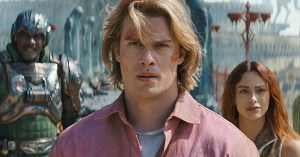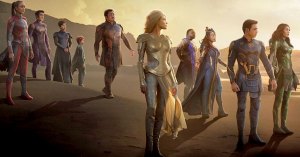Elisabeth Moss’ Five Favorite Films
Elisabeth Moss, best known as Peggy Olson on AMC’s hit series Mad Men, currently stars alongside Jason Schwartzman in the new independent drama Listen Up Philip. When we recently chatted with Moss about her Five Favorite Films, she initially limited her choices to movies about relationships — a major theme in her new film — but as we spoke, we discovered another common thread throughout them. See the full list here:
Annie Hall (Woody Allen, 1977; 98% Tomatometer)
The first one is Annie Hall. All of these movies are movies that… I mean, I feel that most people’s favorite movies are movies that you can see over and over again. That’s just a movie that, you know, I don’t know how many times I’ve seen it and it doesn’t even matter anymore. It’s one of those movies that, every time it comes on TV, I have to sit down and watch it even if I’ve seen it before. To talk about why I love it, I mean, what do I even say? “Because I’m not a moron [laughing]? That’s why I love it?”
That’s a good reason. I like it.
OK, good, we’ll go with that. “Because I’m not a moron.”
Do you remember when you first saw it?
No I don’t. I’ve no idea when I first saw it, no idea.
But you watch it over and over again? Every time it’s on?
For sure. It’s definitely something that, yeah, in fact, just talking about it is making me want to watch it.
You mention relationships in your upcoming film. What is it about the relationship in Annie Hall that is attractive to you?
It’s such a real relationship, you know. I mean the first thing I love about Annie Hall is the humor. It’s just hilarious. It’s a really funny movie. But it’s a very real relationship story and one of my favorite moments is the montage at the end when he goes over all the great moments that he and Annie had. And it’s just that great kind of, like, even after a relationship goes south and you break up or whatever happens, I just love that, the way he looks at it and goes, “Yeah there were a lot of good moments though [laughing].” It has this really, weirdly positive ending.
When Harry Met Sally (Rob Reiner, 1989; 88% Tomatometer)
That’s a film that, for me, that’s one that, even more than Annie Hall, is like an I-know-every-word kind of movie, you know, that I just can’t get over. It’s very comforting to me. It’s one of those comfort films. And it’s also really funny. And it’s one of those movies like… All the things about these romantic comedies and relationship movies or whatever, they don’t even make them like that any more, you know? Except for independent film. Independent film sometimes does, but you don’t really see them.
Yeah, the styles change, even on television. Everything is changing. And I think what happens is sometimes we get kicked back, we revisit what we enjoyed about previous decades and we see a new variation come up again.
Yeah, yeah. Totally.
Sunset Boulevard (Billy Wilder, 1950; 98% Tomatometer)
This is a film — and this is kind of going away from this relationship theme — but this is a film that, when I was little, I loved. I mean, I’ve loved it my whole life. I don’t know what that says about me, but I loved Sunset Boulevard. I was a big old-movie fan when I was, you know, older than most people should be when they’re older-movie fans. [Gloria Swanson is] just so spectacular in that film and it sort of formed my idea of that raw, dramatic acting. And the writing… The writing in that movie is unbelievable. So many incredible one-liners. It’s one of those movies that you can watch now and you’re just, like, “Damn, that was a good line,” you know? Like, God, that was some good writing back then. The thing is that movies written that way wouldn’t fit in, really, these days. It would sound strange, like you couldn’t really do it now. But thank God we have them.
Sweet Smell of Success (Alexander Mackendrick, 1957; 98% Tomatometer)
Another movie I’m going to give you is the same thing. I mean, it’s just that the writing is unbelievable, and that’s Sweet Smell of Success. It was a movie I discovered a little bit later, like maybe in my teens. And that was another move that I was just like, “Jesus, the writing on this thing, it’s unbelievable.” The one-liners are so smart, you know? I loved movies like Sunset Boulevard and I loved the kind of Hitchcock films and all of these kind of things and then I saw Sweet Smell of Success and I was like, “Oooh, this is a little bit naughtier,” you know what I mean? There’s something a little bit darker about that movie. The performances in it are so priceless. It was a little bit more of a leap in the cinematography, I think, than maybe those of, like, Sunset Boulevard or something. The lighting, it was very harsh. They were doing things with the cinematography that I was like, “Ooh, this is naughty,” like, “You’re not supposed to do that.” You know?
So you do have a bit of a dark side.
Yes for sure, for sure. But I mean mainly it was the writing, that is what attracts me to the older black and white classics.
All About Eve (Joseph L. Mankiewicz, 1950; 100% Tomatometer)
I know I’m kind of sticking in an era. I’m sorry. I know I could probably go to cooler areas like the 1960s and 1970s and stuff.
That’s what you like, though.
Yeah, I mean those are the films I can watch over and over again that I’ve loved since I was a little girl. All About Eve probably preceded all of those movies. I definitely saw that first. That started my love affair with Bette Davis. It kind of introduced me to what an actress was. Bette Davis was my first introduction to what an actress was, like a real actress, you know? And I subsequently saw all of her movies. I was obsessed with her when I was a little girl. That ballsy, confident, beautiful but flawed woman. She’s strong, but vulnerable. I felt like the characters she played, the later ones, have all of that, and that, to me, is like, “Oh that’s acting.” Even though it’s probably a lot broader than what we do now, and it’s obviously a different style. To me, Bette Davis was like, “Oh wow, that’s an actress, I get it.”
And there’s so much truth in that movie, it’s a little scary.
Oh my God, completely, completely. And it’s a brilliant script. And again, incredible dialogue. Just full of the most iconic lines. All of these movies… rarely do we have movies these days where you can quote, like… I’m not talking about “I’ll be back” and “Show me the money,” know what I mean [laughing]? I’m talking about really intelligent, quick-witted one-liners. And these movies have, like, 30 of them in every movie.
Right; they don’t make movies like that now.
They probably couldn’t. It probably would be weird and outdated. It would be strange. I mean, you probably couldn’t anymore, but it’s ok because we can just go watch those.
True, and hope that people stop remaking everything.
Exactly, exactly.
Not sure if you realized, but four out of five of your picks here have an entertainment theme.
Oh, that’s true, I didn’t. [Laughing] I didn’t, because I’m a moron, but you’re absolutely right.
No, you’re not a moron, remember? Because you like Annie Hall.
[Laughing] Because I like Annie Hall, exactly. Thank you.
You were obviously drawn to these sorts of films when you were a little girl and now, here you are, doing so well in your career.
For sure, for sure. Yeah, I definitely was attracted to things that had an entertainment theme to them, and musicals and things about Broadway and all of that kind of thing, I definitely was attracted to.
Listen Up Philip is currently in theaters in limited release.







